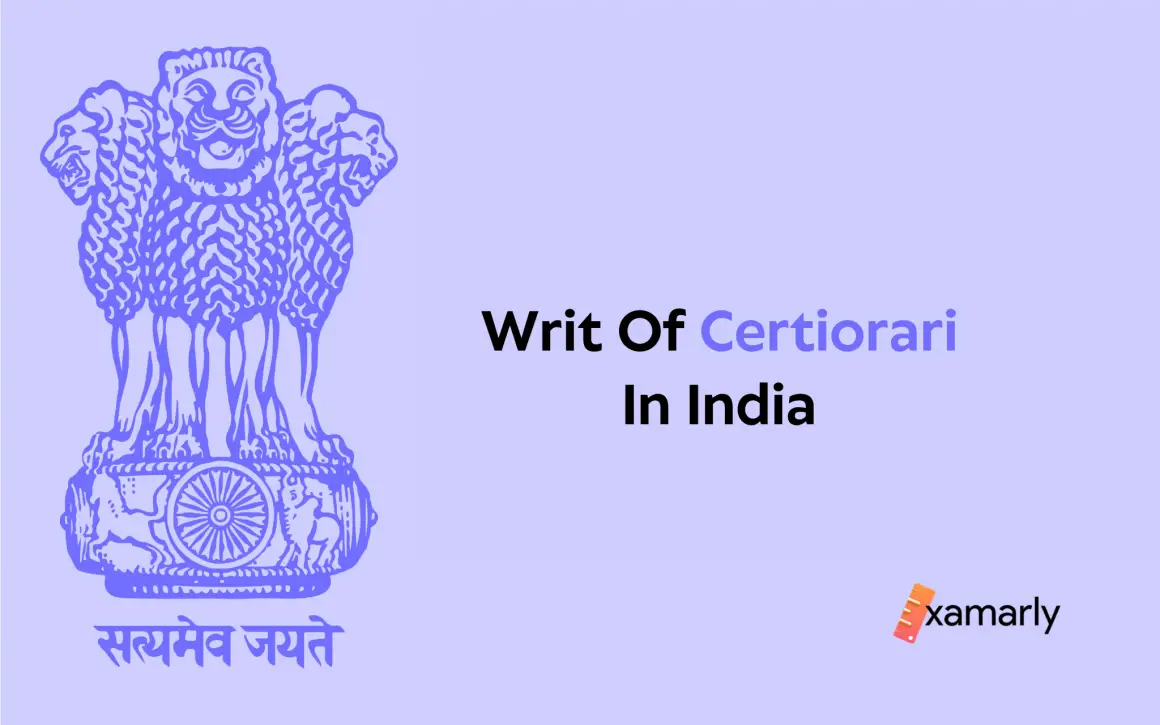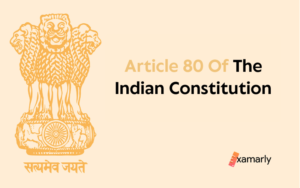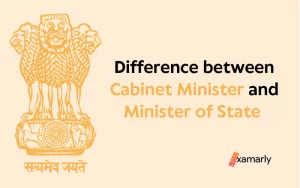A writ of certiorari in India is a constitutional remedy that can be used to quash the decision of a lower court or tribunal that has made jurisdictional errors or violated the law.
It helps keep a check on the abuse of jurisdiction by a body for examination regarding the courts in India.
It is the third type of the 5 main Types Of Writs In India.
In this article, we’ll go in-depth into the writ of certiorari in India for a thorough understanding.
- What Is The Writ Of Certiorari In India?
- Essential Conditions For The Writ Of Certiorari In India
- Writ Of Certiorari In India – Characteristics
- Writ Of Certiorari In India – Grounds
- Against Whom The Writ Of Certiorari In India Can Be Issued?
- Writ Of Certiorari In India – Who Can File A Writ Petition?
- Writ Of Certiorari In India – Where Can A Writ Petition Be Filed?
- Procedure To File A Writ Of Certiorari In India
- Writ Of Certiorari In India & The Right To Legal Remedy
- Cases Related To The Writ Of Certiorari In India
- Summary
- FAQs Related To The Writ Of Prohibition In India
- What is a writ of certiorari in India?
- How does a writ of certiorari differ from a writ of prohibition?
- What is the purpose of a writ of certiorari in India?
- Who can file a writ of certiorari in India?
- Where can a writ of certiorari be filed in India?
- What are the grounds for filing a writ of certiorari in India?
- Is a writ of certiorari a discretionary remedy in India?
What Is The Writ Of Certiorari In India?
It is a Latin term which means “to be informed of” and is used to bring the records of the lower court or administrative body to the higher court for review.
By nature, the writ of certiorari in India is a prerogative writ, which means that it directs the behaviour of another arm of the government.
The writ of certiorari in India is a corrective remedy issued by a higher court like the Supreme Court or High Court to a lower court or tribunal, directing it to send the records of a case for review.
The writ of certiorari can be used to challenge the decision of both judicial and quasi-judicial bodies, such as administrative authority/tribunals & related public authorities, as long as they exercise judicial or quasi-judicial functions.
However, the writ cannot be used to challenge the decision of administrative bodies or private individuals.
The writ of certiorari is generally used when there is no other remedy available to the petitioner, and it can be issued at any stage of the proceedings against the concerned public office.
The nature of this writ can be used to challenge the decision of a lower court or tribunal on the grounds of lack of jurisdiction, violation of principles of natural justice, or error of law by a public office/legal authority.
It is important to note that, the writ of certiorari can only be issued if the lower court or tribunal has acted without jurisdiction or in excess of jurisdiction or in violation of principles of natural justice and not to review the merits of a case or to challenge the findings of a lower court or tribunal.
And also, it cannot be used as a substitute for an appeal or revision, and can only be used to correct a past action of any administrative authority/public office.
Origin Of The Writ Of Certiorari In India
The writ of certiorari in India, has its origin in English Common Law, and it was introduced to India through the Indian High Courts Act, 1861.
The legislation gave the High Courts the legal authority for issuing writs in India.
It was later reinforced by the Indian Constitution, which came into effect in 1950, under Article 226 of the Indian Constitution, which grants the High Courts the power to issue writs for the enforcement of fundamental rights and for any other purpose of any public office.
The power of the High Courts to issue writs of certiorari is also recognised by the Code of Civil Procedure (CPC) and the Code of Criminal Procedure (CrPC).
It was introduced as a legal remedy to quash the decision of a lower court or tribunal that has acted in excess of its jurisdiction or in violation of the law and to bring the records of a case before a higher court for review, to ensure that the lower court or tribunal had acted within its jurisdiction and in accordance with the law.
Essential Conditions For The Writ Of Certiorari In India
There are certain essential conditions that must be met in order for a writ of certiorari in India to be issued.
These include:
- The lower court or tribunal must have acted in excess of its jurisdiction or in violation of the law/duties.
- The petitioner must have exhausted all other available remedies, such as an appeal or revision.
- The writ must be sought within a reasonable time after the decision of the lower court or tribunal.
- The writ must be sought for the purpose of correcting a past action, and not as a means of challenging a final decision.
- The writ must be sought on the ground that the lower court or tribunal has acted without jurisdiction or in excess of jurisdiction or in violation of principles of natural justice.
- The writ of certiorari can be issued only if there is no other efficacious remedy available to the petitioner.
- The writ of certiorari can be issued only if the lower court or tribunal has acted without jurisdiction or in excess of jurisdiction or in violation of principles of natural justice to its duties.
It is important to note that, the High Court while issuing certiorari, has to be satisfied that, the lower court or tribunal has acted without jurisdiction or in excess of jurisdiction or in violation of principles of natural justice and that, the writ of certiorari is the only remedy available to the petitioner.
Writ Of Certiorari In India – Characteristics
The characteristics of the writ of certiorari in India are as follows:
- It is used to quash the decision of a lower court or tribunal that has acted in excess of its jurisdiction or in violation of the law.
- It is issued by a higher court to a lower court or tribunal, directing it to send the records of a case for review.
- It can be used to challenge the decision of both judicial and quasi-judicial bodies, such as administrative tribunals, as long as they exercise judicial or quasi-judicial functions.
- It can be used to correct a past action, but not to challenge a final decision.
- A writ can only be granted if the lower court or tribunal has acted outside its jurisdiction, exceeded its jurisdiction, or failed to comply with the principles of natural justice.
- It can be sought if no other remedies are available to the petitioner.
- It can be issued at any stage of the proceedings.
- It is generally considered as a powerful remedy which provides an effective check on the functioning of lower courts and tribunals.
- It serves as a safeguard against arbitrary or unjust decisions, and helps to uphold the rule of law and protect the rights of citizens.
- The High Court while issuing certiorari, has to be satisfied that, the lower court or tribunal has acted without jurisdiction or in excess of jurisdiction or in violation of principles of natural justice and that, the writ of certiorari is the only remedy available to the petitioner.
Writ Of Certiorari In India – Grounds
The writ of certiorari in India can be sought on the following grounds:
- Lack of jurisdiction: If the lower court or tribunal has acted without the authority or jurisdiction to hear the case, a writ of certiorari can be sought to quash its decision.
- Error of law: If the lower court or tribunal has made an error of law in its decision, a writ of certiorari can be sought to correct it.
- Violation of principles of natural justice: If the lower court or tribunal has acted in violation of the principles of natural justice, such as by not providing a fair hearing or by not giving the parties an opportunity to be heard, a writ of certiorari can be sought to quash its decision.
- Excess of jurisdiction: If the lower court or tribunal has exceeded its jurisdiction in its decision, a writ of certiorari can be sought to correct it.
- Improper exercise of jurisdiction: If the lower court or tribunal has exercised its jurisdiction in a manner that is improper, such as by acting in an arbitrary or capricious manner, a writ of certiorari can be sought to quash its decision.
- The lower court or tribunal operated without authority, outside its authority, or contrary to the rules of natural justice.
It is important to note that, as per the nature of the writ of certiorari in India, it can only be issued if the lower court or tribunal has acted without jurisdiction or in excess of jurisdiction or in violation of principles of natural justice, and it is not meant to review the merits of a case or to challenge the findings of a lower court or tribunal.
Against Whom The Writ Of Certiorari In India Can Be Issued?
The writ of certiorari in India can be issued against judicial and quasi-judicial bodies, such as lower courts and tribunals.
These may include:
- District courts, sessions courts, and other courts of lower rank.
- Administrative tribunals, such as the Central Administrative Tribunal (CAT) and State Administrative Tribunals (SAT).
- Special courts and tribunals established under specific laws, such as the Income Tax Appellate Tribunal (ITAT) and the National Green Tribunal (NGT).
- University or college tribunals.
- Arbitral tribunals.
It is important to note that the writ of certiorari in India cannot be issued against administrative bodies or a private person.
If a person, public body or an organisation is not part of the legal system, then writ of certiorari cannot be issued against them.
Writ Of Certiorari In India – Who Can File A Writ Petition?
The writ of certiorari in India can be filed by any person who is aggrieved by the decision of a lower court or tribunal that has acted in excess of its jurisdiction or in violation of the law.
This includes:
- The person directly affected by the decision of the lower court or tribunal
- An individual or organisation with a legal interest in the outcome of the case
- A person or organisation seeking to enforce a fundamental right guaranteed by the Indian Constitution
- A public-spirited individual or organisation seeking to enforce public interest
- An individual or organisation authorised by the court to file the writ petition on behalf of the aggrieved person
- The government or any of its agencies, in cases where the decision of the lower court or tribunal affects the public interest.
It is important to note that, the person who is filing the writ petition should have a locus standi (legal standing) to file the petition, meaning they have a right, interest or injury that’s affected by the provisions/decisions of the lower court or tribunal.
Writ Of Certiorari In India – Where Can A Writ Petition Be Filed?
A writ petition for the writ of certiorari in India can be filed with the High Court having jurisdiction over the area where the lower court or tribunal that issued the impugned decision is located.
Under Article 226 of the Indian Constitution, the High Courts have the power to issue writs for the enforcement of fundamental rights and for any other purpose, throughout their respective territories.
Therefore, the writ of certiorari can be filed with the High Court of the state where the lower court or tribunal that issued the impugned decision is located.
It’s important to note that, in certain cases where the decision of the lower court or tribunal has an all India ramification, the writ of certiorari can be filed with the Supreme Court of India for a judicial review.
Procedure To File A Writ Of Certiorari In India
In India, a writ of certiorari is filed in the High Court or the Supreme Court to challenge the legality of a decision or order made by a lower court, tribunal, or administrative body.
The procedure for filing a writ of certiorari in India is as follows:
- The petition for writ of certiorari is filed in the appropriate court, either the High Court or the Supreme Court, depending on the jurisdiction of the lower court or administrative body whose decision is being challenged.
- The petition must be accompanied by all relevant documents, including the order or decision being challenged, and any other evidence that supports the petitioner’s case.
- The court will then consider the petition and may issue notice to the other party, giving them an opportunity to respond.
- After considering the petition and any responses, the court will either dismiss the petition or grant the writ of certiorari, which means that the lower court’s decision or order is quashed and the matter is sent back to the lower court for reconsideration.
It is important to note that a writ of certiorari is a discretionary remedy, and the court may refuse to grant the writ if it finds that the petitioner has an alternative remedy available to them.
Also, the court will consider the petition based on merits of the case, and if the court finds that the order passed by the lower court is perfectly legal, the writ petition would be dismissed.
Writ Of Certiorari In India & The Right To Legal Remedy
A writ of certiorari is a legal remedy in India that is used to challenge the legality of a decision or order made by a lower court, tribunal, or administrative body.
This writ is issued by a higher court, such as the High Court or the Supreme Court, to a lower court or administrative body, directing it to send the records of a case to the higher court for review.
The right to legal remedy is a fundamental right in India, as provided under Article 32 Of The Indian Constitution.
This means that every individual has the right to approach the courts for the enforcement of their fundamental rights.
This provision is one of the many legal remedies available to individuals in India to seek justice and protection of their rights.
In short, the writ of certiorari is a legal remedy in India that can be used to challenge the legality of a decision or order made by a lower court, tribunal, or administrative office and the right to legal remedy is a fundamental right that guarantees every individual the right to approach the courts for the enforcement of their fundamental rights.
Cases Related To The Writ Of Certiorari In India
There are several cases around matters related to the writ of certiorari in India, some of which are:
- State of Rajasthan v. Union of India (1977): This case dealt with the power of the President of India to revoke a proclamation of emergency under Article 356 Of The Indian Constitution. The Supreme Court held that the President’s power to revoke a proclamation of emergency is subject to judicial review and can be challenged by way of a writ of certiorari.
- R.D. Shetty v. International Airport Authority (1979): This case dealt with the validity of the action of the International Airport Authority in terminating the lease of land to a private operator. The Supreme Court held that the action of the International Airport Authority could be challenged by way of a writ of certiorari.
- K.K. Kochunni v. State of Kerala (1978): This case dealt with the validity of the action of the State of Kerala in acquiring land for the construction of a dam. The Supreme Court held that the action of the State of Kerala could be challenged by way of a writ of certiorari.
- K.S. Subramanian v. State of Tamil Nadu (2000): This case dealt with the validity of the dismissal of a government employee by the State of Tamil Nadu. The Supreme Court held that the dismissal of a government employee could be challenged by way of a writ of certiorari.
- S.P. Gupta v. Union of India (1981): This case dealt with the validity of the appointment of judges to the Supreme Court and the High Courts. The Supreme Court held that the appointment of judges could be challenged by way of a writ of certiorari.
These are some of the cases where writ of certiorari has been used in India, it is not an exhaustive list and there are many more matters/cases where writ of certiorari has been used to challenge the legality of a decision or order made by a lower court, tribunal, or administrative body.
Summary
In summary, the writ of certiorari is a legal remedy in India that is used to challenge the legality of a decision or order made by a lower court, tribunal, or administrative office.
The writ of certiorari is one of the many legal remedies available to individuals in India to seek justice and protection of their rights.
It can be used to challenge a wide range of decisions, from the dismissal of a government employee to the revocation of a proclamation of emergency, and many more.
You Might Also Like To Read: Writ Of Prohibition In India.
FAQs Related To The Writ Of Prohibition In India
What is a writ of certiorari in India?
A writ of certiorari is a legal remedy in India that is used to challenge the legality of a decision or order made by a lower court, tribunal, or administrative body.
It is a Latin term which means “to be informed of” and it is used to bring the records of the lower court or administrative body to the higher court for review.
How does a writ of certiorari differ from a writ of prohibition?
A writ of certiorari is used to quash the decision or order of a lower court, tribunal, or administrative body, whereas a writ of prohibition is used to prevent a lower court, tribunal, or administrative body from exceeding its jurisdiction or from continuing with a proceeding that is beyond its jurisdiction.
What is the purpose of a writ of certiorari in India?
The purpose of a writ of certiorari in India is to challenge the legality of a decision or order made by a lower court, tribunal, or administrative body, and to bring the records of the lower court or administrative body to the higher court for review.
Who can file a writ of certiorari in India?
A writ of certiorari can be filed by an aggrieved person in India, who is affected by the decision or order of a lower court, tribunal, or administrative body that is illegal or improper.
Where can a writ of certiorari be filed in India?
A writ of certiorari can be filed in the High Court or the Supreme Court, depending on the jurisdiction of the lower court, tribunal, or administrative body whose decision or order is being challenged.
What are the grounds for filing a writ of certiorari in India?
The grounds for filing a writ of certiorari in India are that the decision or order of the lower court, tribunal, or administrative body is illegal or improper.
Is a writ of certiorari a discretionary remedy in India?
Yes, a writ of certiorari is a discretionary remedy in India, meaning that the court may refuse to grant the writ if it finds that the petitioner has an alternative remedy available to them.
The court will consider the petition based on merits of the case, if the court finds that the order passed by the lower court is perfectly legal, the writ petition would be dismissed.






